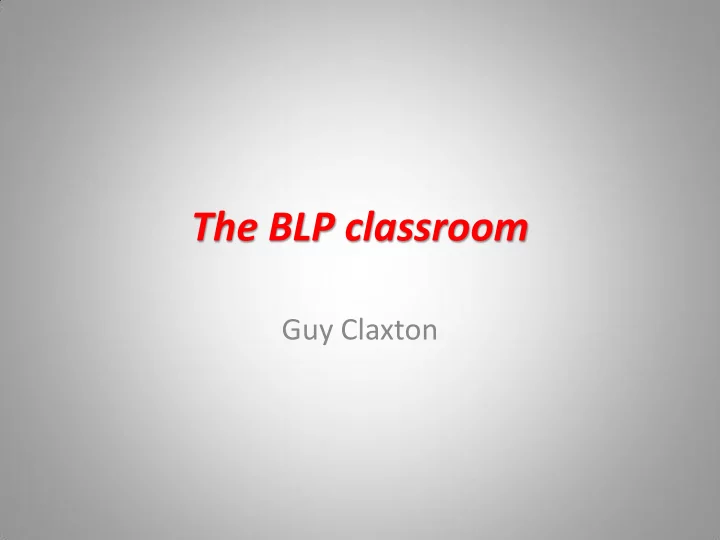

The BLP classroom Guy Claxton
RESILIENCE – emotional strength • Inquisitive : has a questioning and positive attitude to learning • Persistent : stays determined, positive and patient in the face of difficulty or mistakes • Adventurous : willing to risk and ‘have a go’; up for a new challenge • Focused : observant, concentrates well, ignores distractions, becomes engrossed
RESOURCEFULNESS – cognitive capability • Imaginative : comes up with creative ideas and possibilities; visualises • Connecting : looks for links and relationships; likes to ‘hook things up’; uses metaphor • Crafting : keen to work on improving products; practising and developing skills • Capitalising : makes good use of resources, tools and materials
REFLECTION – strategic awareness • Methodical : well-organised; thinks things through carefully • Self-evaluative : makes honest and accurate judgements about ‘how it’s going’ • Self-aware : knows their own strengths, styles and interests as a learner • Transferring : looks for other applications and lessons for the future
RELATING – social sophistication • Collaborative: a good team-player; helps groups to work well together • Open-minded : asks for, listens to and makes good use of information, feedback and advice • Independent: able to ‘stand their ground’; shows initiative • Empathic: understands others; offers helpful feedback and suggestions; receptive and imitative
Use the language all the time e.g. how you write reports… Juan is getting better at – bringing his own questions into class, asking when he doesn’t understand, working with a range of others, thinking things through, seeing how he can improve what he’s done… Qing is becoming more – resilient in the face of difficulty, imaginative in her writing, thoughtful about her own work, sceptical about what she reads, careful in her checking, willing to push herself…
Describe a student’s • Inquisitive learning power • Focused • Determined • Think of a student you • Adventurous have known for a least a • Imaginative year (or your own • Analytical • Making links child). Describe them to • Craftsmanlike your neighbour in terms • Self-evaluative of any positive changes • Collaborative you have seen in their • Independent learning habits • Empathic • ……….. • ………..
Split-screen activities • Teaching – Science and questioning – History and empathy – English and risk-taking – Maths and self-evaluating – PE and imitating
Remember… • Getting students to use a learning habit is not the same as getting them to stretch it
Design a lesson to stretch a learning muscles Questioning Imagining Planning Collaborating English Maths Science History
Design a lesson to stretch a learning muscles Questioning Imagining Planning Collaborating English 1 2 3 4 Maths 5 6 7 8 Science 9 10 11 12 History 13 14 15 16
Learnish: the language of learning process classroom chat that foregrounds the ups and downs of learning • How did you do that? • How else could you have done that? • Which are the tricky bits? What’s tricky about them? • What could you do when you are stuck on that? • How could you help someone else understand that? • How could I have taught that better? • Where else could you use that? • How could you make that harder for yourself?
Varied learning routines • Try Three Before Me – Brain – Book – Buddy - Boss • See – Think – Wonder • Plus – Minus – Interesting • Independent – Collaborative – Teacher • Other People’s Shoes • Two Stars and a Wish… – For the teacher – Cutting out the stars – About learning muscles
Use visual tools
Display students’ work -in-progress
Involve pupils in designing / evaluating / repairing their education • Qualified student teachers • Student lesson observers • Give you ‘2 stars and a wish’ • ‘What’s the best group size?’ • ‘How well are we working?’ • Harris Student Commission
Reflective writing – • Today’s lesson was to be honest quite tough. It taught me to ask a lot more myself as a questions that I usually wouldn’t learner… even think about. I don’t think I showed much sign of persevering though…Today I wasn’t a strong contributor to my group…but I thought one of my strengths was being able to listen…I don’t think I asked the right questions to intensify my learning. If I was able to question myself or others more, I think I would have gained a much better understanding of the topic… What I need to improve on for the next lesson is talking about roles and responsibilities in the group…and persevere through tough times. – Debbie Ngo, Year 9, Bankstown Girls’ School, Sydney •
Develop extended inquiry
Give students responsibility
When do I use my learning habits? • Boggles : when I feel confused or uncertain • Snarks : things I ’d like to (be able to) do but can’t yet • Boojums : especially important, challenging or tricky things
Make links to and from life • Find the real-world tap-root of every students’ learning passions • “How could you use that learning power over here ?” • Home learning – looking for the transfer
Learner
What BLP teachers do 1. Notice and comment on childen’s developing learning muscles 2. F ocus ‘feedback’ on aspects of learnable power 3. G et students talking and writing about the ‘how’ of learning 4. Model inquisitive and fallible learners 5. Display learning images and work in progress 6. Plan activities that deliberately stretch various learning muscles 7. Encourage extended, difficult learning projects 8. Involve learners as resources, teachers and co-designers 9. Look for links with the outside world
• www.buildinglearningpower.co.uk • www.expansiveeducation.net • guy.claxton@winchester.ac.uk
Recommend
More recommend